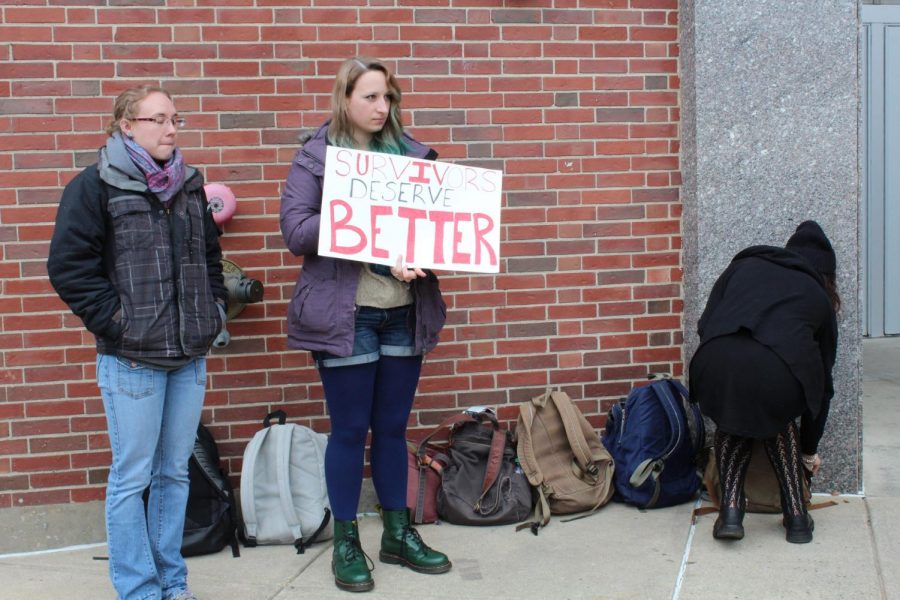Whether you are aware of it or not, you have most likely interacted with someone who is a victim of sexual assault, considering that an American is sexually assaulted every 98 seconds. One reason that you may be unaware of it is because of the gray area and stigma surrounding the subject. In order to stay safe on campus, certain stigmas must be debunked, and available resources must be identified.
One overarching stigma behind sexual assault is that women are the only victims. It is essential to realize sexual assault does not discriminate – it can happen to anyone, no matter their race, gender, sexual orientation, age, etc. Although it is not as common, men are victims of sexual assault. Despite the fact that one in six men have been sexually assaulted or abused, this issue continues to be neglected by the dominant ideology regarding the issue. Male victims can visit 1in6.org to access a 24/7 helpline chat specializing in aiding male sexual assault victims.
When categorizing men by sexual identity, the Centers for Disease Control and Prevention’s National Intimate Partner and Sexual Violence Survey found that 40 percent of homosexual men and 47 percent of bisexual men have experienced sexual violence (excluding rape). This percentage falls to 21 percent for heterosexual men. Surveys of the LGBTQ+ community are also often neglected in the conversation of sexual assault. The 2015 Transgender Survey found that 47 percent of transgender people report being sexually assaulted at some point in their life, proving there is more to be talked about in the conversation of sexual assault than is typically addressed.
There are a number of hotlines available for female victims of sexual assault to confide in, the dominant one being the 24 hour Rape, Abuse & Incest National Network (RAINN) hotline, which can be reached at 1-800-656-4673. For support within the University of Massachusetts community, the Center for Women and Community offers a 24-hour hotline which can be reached at 413-545-0800. This hotline welcomes calls from those of all gender identifications and sexual orientations. The Center for Women and Community also facilitates support groups for victims of sexual assault.
Although sexual assault can happen anywhere at any time, its prevalence on college campuses cannot be ignored. Considering that 8.8 percent of all females and 2.2 percent of all males are victim to rape or sexual assault through physical force, violence or incapacitation while in college, being aware of prevention strategies is essential. It must be noted that victims of sexual assault should not blame themselves and feel as if they should have practiced one of these strategies in order to avoid being assaulted. Again, sexual assault can happen to anyone at any time. Despite this, certain prevention strategies can help in keeping you safe.
One strategy that is always in the back of my mind is to never walk outside alone past dark. Most women probably practice this on a nightly basis without thinking twice about it, but it is something men should practice as well. If you do find yourself walking alone at night, consider calling a friend as you walk. Also, be sure to take note of help phones near you, which will put you in direct contact with the UMass Police Department. The locations of these phones can be found here.
One social setting these strategies especially must be practiced in is at a party. If you aren’t convinced that exercising prevention strategies at parties is vital, consider the fact that one in 13 college students report having been drugged or suspect that they have been druggedat some point.When at a party, ensuring that you only drink things that you opened yourself and making sure you watch your drink at all times can drastically minimize your chances of being drugged. If you are interested in taking an extra step toward keeping yourself safe, a number of productsexist to detect drugs in drinks.
In the event of sexual assault, on-campus organizations are here for you. These organizations include UMPD, the Center for Women and Community and the Dean of Students Office. Contact information and hours for these resources can be found on their respective websites. The next step which must be taken within five days of assault is obtaining a Sexual Assault Nurse Examination Kit, which can be found most conveniently at University Health Services. Lastly, one must consider their options when choosing whether they want to report their assault or not. If reporting the assault is the appropriate choice, multiple organizations on campus are prepared to walk you through the steps of reporting. These organizations include the Dean of Students Office, the Office of Equal Opportunity and Diversity and University Health Services. The full list of UMass organizations that process reports of sexual assault can be found here.
The undeniable presence of sexual assault, regardless of what form it may come in, cannot and should not be ignored. The on-campus resources identified above are equipped to aid victims of sexual assault, in addition to national hotlines (RAINN, 1in6.org, etc.). This issue shows no sign of going away any time soon, so it is vital to come to terms with the reality of it in order to create an informed and safe UMass community.
Isabel Levin is a Collegian columnist and can be reached at [email protected].




















Jake • Oct 16, 2018 at 6:26 pm
Phenomenal. Your focus on both male and female victims was imperative to the article, making it both more enjoyable and more relatable for all readers. Keep it up.
Phyllis Levin • Oct 16, 2018 at 10:59 am
Unbelievable article